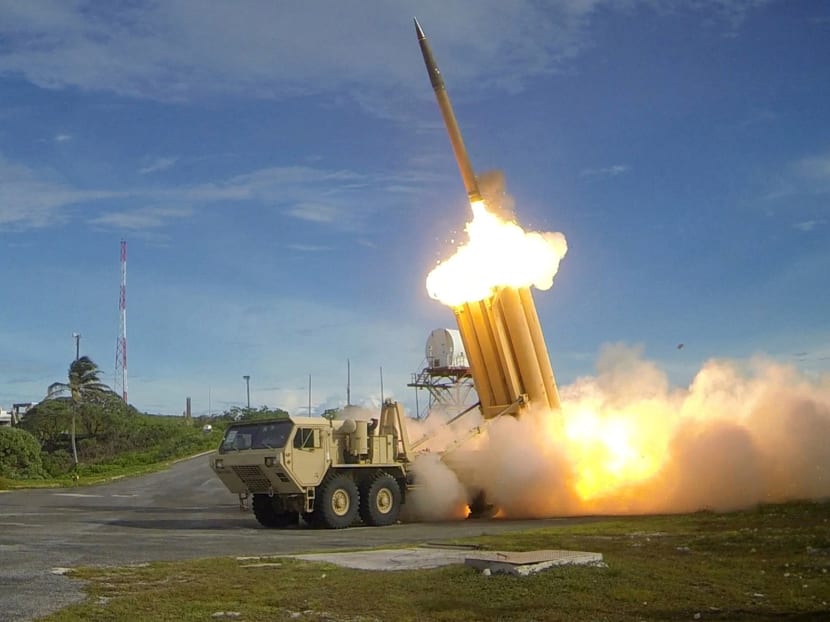US starts to install Thaad in South Korea
SEOUL — The United States military started moving parts of an anti-missile defence system to a deployment site in South Korea on Wednesday (April 26), triggering criticism from China amid tensions over North Korea’s weapons development.

A Terminal High-Altitude Area Defense System, or Thaad, undergoes a test. Photo: Ralph Scott/United States Department of Defense via The New York Times
SEOUL — The United States military started moving parts of an anti-missile defence system to a deployment site in South Korea on Wednesday (April 26), triggering criticism from China amid tensions over North Korea’s weapons development.
The earlier-than-expected steps to deploy the Terminal High Altitude Area Defence (Thaad) system also drew protests in South Korea and was denounced by the frontrunner in the country’s presidential election to be held next month.
South Korea’s defence ministry said elements of Thaad were moved to the deployment site, on what had been a golf course, about 250 km south of Seoul.
“South Korea and the United States have been working to secure an early operational capability of the Thaad system in response to North Korea’s advancing nuclear and missile threat,” the ministry said in a statement.
The battery was expected to be operational by the end of the year, it said.
The US and South Korea agreed last year to deploy Thaad to counter the threat of missile launches by North Korea. They say it is solely aimed at defending against North Korea.
But China says the system’s advanced radar can penetrate deep into its territory and undermine its security, while it will do little to deter the North. It has been adamant in its opposition.
“China strongly urges the United States and South Korea to stop actions that worsen regional tensions and harm China’s strategic security interests and cancel the deployment of the Thaad system and withdraw the equipment,” Chinese foreign ministry spokesman Geng Shuang told a briefing.
“China will resolutely take necessary steps to defend its interests,” he said on Wednesday, without elaborating.
Television footage showed military trailers carrying equipment, including what appeared to be launch canisters, to the battery site.
Hundreds of residents shouted and hurled water bottles at the vehicles over lines of police holding them back. More than 10 protesters were injured, some of them with fractures after clashing with the police.
The US and North Korea have been stepping up warnings to each other in recent weeks over Pyongyang’s development of nuclear weapons and missiles in defiance of United Nations resolutions.
North Korea’s nuclear and missile threat is perhaps the most serious security challenge confronting US President Donald Trump. He has vowed to prevent North Korea from being able to hit the US with a nuclear missile.
The US began moving the first elements of the system to South Korea last month after the North tested four ballistic missiles.
The US is sending the USS Carl Vinson carrier strike group to waters off the Korean peninsula, where it will join the USS Michigan, a nuclear submarine that docked in South Korea on Tuesday. South Korea’s navy has said it will hold drills with the US strike group.
US defence leaders and other top officials were due to give a classified briefing on North Korea to all senators in an unusual meeting at the White House.
North Korea says it needs the weapons to defend itself and has vowed to strike the US and its Asian allies at the first sign of any attack on it.
On Tuesday, leader Kim Jong-un supervised North Korea’s “largest-ever” live-fire drill to mark Tuesday’s 85th founding anniversary of its military, with more than 300 large-calibre, self-propelled artillery pieces on its east coast.
North Korea’s foreign ministry denounced a scheduled UN Security Council meeting tomorrow, chaired by American Secretary of State Rex Tillerson, saying Washington was “not morally entitled” to force member states to impose sanctions on it.
“It is a wild dream for the US to think of depriving the DPRK (Democratic People’s Republic of Korea) of its nuclear deterrent through military threat and sanctions. It is just like sweeping the sea with a broom,” the official Korean Central News Agency cited a foreign ministry spokesman as saying.
China is North Korea’s sole major ally and is seen as crucial to US-led efforts to rein in its bellicose, isolated neighbour.
Chinese President Xi Jinping on Monday called for “restraint” regarding North Korea in a telephone conversation with Trump.
The South is holding a presidential election next month to choose a successor to ousted leader Park Geun-Hye, and Seoul and Washington are pressing ahead with the deployment with some candidates ambivalent over the system, including front-runner Moon Jae-in, of the left-leaning Democratic Party.
His spokesman Park Kwang-On expressed “strong regret” at the deployment, saying it ignored “required procedures”.
“This move has shut off any room for policy considerations by the next government and it is very improper,” he said. AGENCIES






